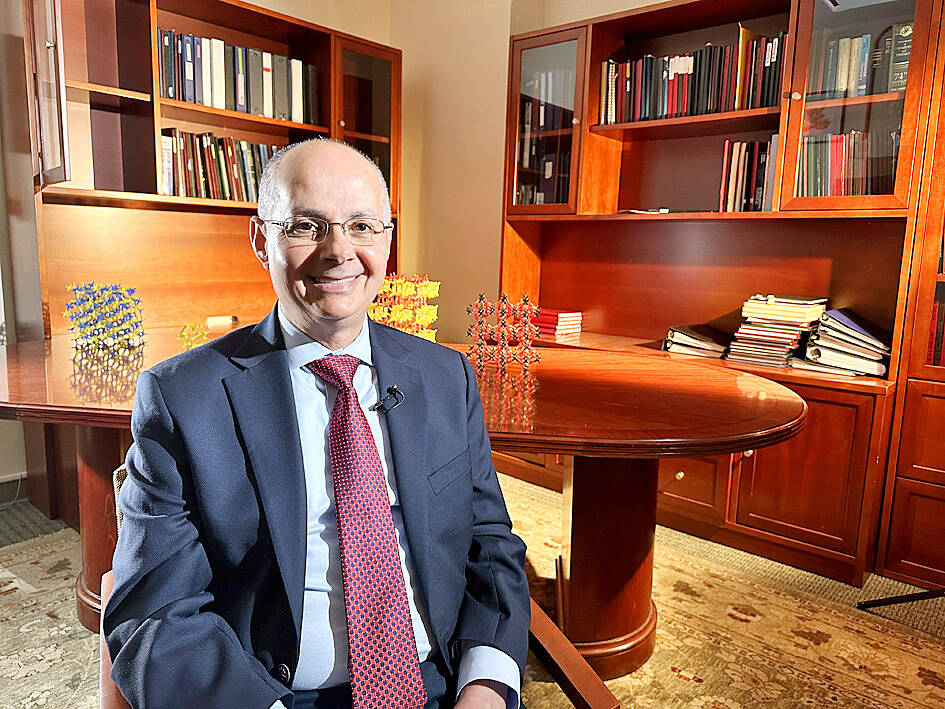Omar Yanghi yesterday was named this year’s winner of the Tang Prize in Sustainable Development.
Yanghi, a professor of chemistry at the University of California, Berkeley, was awarded for developing frameworks that can be tailored to harvest water from desert air, capture carbon, or store hydrogen and methane, the Tang Prize Foundation said.
Born in Amman to a refugee family from Palestine, Yanghi grew up in Jordan’s desert environment, the foundation said.

Photo: CNA
He understands the power that science and research have to transform lives in regions where opportunities are scarce, it said.
Yanghi’s contributions to sustainable development are pioneering the development of reticular chemistry, a new field that is focused on making materials by stitching organic and inorganic units into robust, porous, crystalline metal-organic frameworks (MOFs) and covalent organic frameworks (COFs), the foundation said.
“He demonstrated how hydrogen, methane, carbon dioxide and water from air can be trapped, concentrated and manipulated by these two extensive classes of novel framework materials,” it said. “Those materials in turn have created new avenues and are at the forefront of solving the world’s most pressing challenges of energy, environment and, in particular water sustainability.”
The materials created through Yanghi’s frameworks make storage of large quantities of hydrogen and methane safer, it said, adding that they open doors for methods to harvest potable water.
MOFs and COFs have the potential to improve hydrogen storage efficiency, and MOFs in fuel tanks can potentially triple the amount of methane stored at room temperature and safe pressures, making it possible for vehicles to triple their range, the foundation said.
Yanghi’s studies found that carbon dioxide storage capacity can be increased 18-fold at room temperature simply by adding MOFs, while MOFs and COFs are capable of selectively capturing carbon dioxide from combustion gases, it said.
Yanghi also discovered that MOFs seek and trap water from low-humidity air and concentrate it within their pores, it said.
Using the reticular approach, he designed a water harvester to deliver fresh drinking water in arid regions using only sunlight as energy, it said.
His research group designed MOF water harvesters and installed them in some of the world’s driest areas, and the water from them has been shown to have exceeded standards for drinking water set by the US Food and Drug Administration and the US Environmental Protection Agency, the foundation said.
Yanghi’s contributions are unique, as he has succeeded in taking a groundbreaking branch of science to “unprecedented levels of practical applications for sustainability,” it said, adding that the technology is now being pursued by laboratories, start-ups, and major chemical firms and automakers.
The value of the technology was estimated at US$351 million in 2022, up from US$271 million in 2021, it said.
He holds 60 patents for the technology, has won awards in 17 countries and presided over a mentoring program for the technology, which is implemented in research centers he built in Argentina, Jordan, Malaysia, Mexico, Saudi Arabia and Vietnam, the foundation said.

Taiwan has received more than US$70 million in royalties as of the end of last year from developing the F-16V jet as countries worldwide purchase or upgrade to this popular model, government and military officials said on Saturday. Taiwan funded the development of the F-16V jet and ended up the sole investor as other countries withdrew from the program. Now the F-16V is increasingly popular and countries must pay Taiwan a percentage in royalties when they purchase new F-16V aircraft or upgrade older F-16 models. The next five years are expected to be the peak for these royalties, with Taiwan potentially earning

STAY IN YOUR LANE: As the US and Israel attack Iran, the ministry has warned China not to overstep by including Taiwanese citizens in its evacuation orders The Ministry of Foreign Affairs (MOFA) yesterday rebuked a statement by China’s embassy in Israel that it would evacuate Taiwanese holders of Chinese travel documents from Israel amid the latter’s escalating conflict with Iran. Tensions have risen across the Middle East in the wake of US and Israeli airstrikes on Iran beginning Saturday. China subsequently issued an evacuation notice for its citizens. In a news release, the Chinese embassy in Israel said holders of “Taiwan compatriot permits (台胞證)” issued to Taiwanese nationals by Chinese authorities for travel to China — could register for evacuation to Egypt. In Taipei, the ministry yesterday said Taiwan

‘LIKE-MINDED PARTNER’: Tako van Popta said it would be inappropriate to delay signing the deal with Taiwan because of China, adding he would promote the issue Canadian senators have stressed Taiwan’s importance for international trade and expressed enthusiasm for ensuring the Taiwan-Canada trade cooperation framework agreement is implemented this year. Representative to Canada Harry Tseng (曾厚仁) in an interview with the Central News Agency (CNA) said he was increasingly uneasy about Ottawa’s delays in signing the agreement, especially as Ottawa has warmed toward Beijing. There are “no negotiations left. Not only [is it] initialed, we have three versions of the text ready: English, French and Mandarin,” Tseng said. “That tells you how close we are to the final signature.” Tseng said that he hoped Canadian Prime Minister Mark Carney

Taiwan is awaiting official notification from the US regarding the status of the Agreement on Reciprocal Trade (ART) after the US Supreme Court ruled US President Donald Trump's global tariffs unconstitutional. Speaking to reporters before a legislative hearing today, Premier Cho Jung-tai (卓榮泰) said that Taiwan's negotiation team remains focused on ensuring that the bilateral trade deal remains intact despite the legal challenge to Trump's tariff policy. "The US has pledged to notify its trade partners once the subsequent administrative and legal processes are finalized, and that certainly includes Taiwan," Cho said when asked about opposition parties’ doubts that the ART was